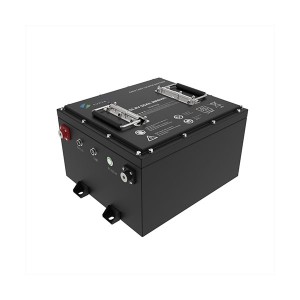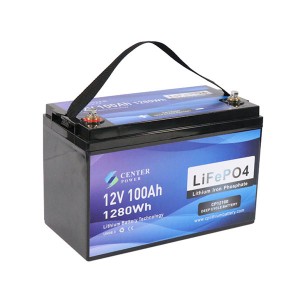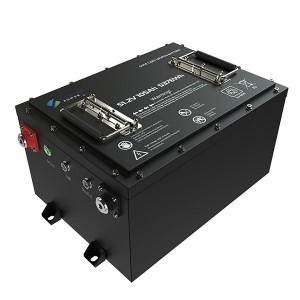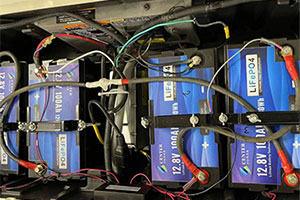
Power Your Golf Cart with Dependable, Long-lasting Batteries
Golf carts have become ubiquitous not only on golf courses but also at airports, hotels, theme parks, universities, and more. The versatility and convenience of golf cart transportation relies on having a robust battery system that can deliver reliable power and long runtimes.
When it's time to replace your golf cart batteries, it pays to understand your options so you can choose the right batteries to meet your needs in terms of voltage, capacity, lifespan and budget. With the right deep cycle batteries, you'll keep your golf fleet rolling for years to come.
Voltage - The Power Behind Your Golf Cart
Voltage - The Power Behind Your Golf Cart
The speed and capabilities of your golf cart depend directly on its battery voltage. Most golf carts operate on 36 or 48 volts. Here's an overview:
- 36 Volt Carts - The most common systems provide a balance of moderate speed and shorter recharge times. Each battery contributes 6 volts for a total of 36 volts with 6 batteries. This is ideal for basic small to mid-size carts used for short trips.
- 48 Volt Carts - For more power, faster speeds and expanded on-board electronics, 48 volt carts rule. Each battery may be 6 or 8 volts, with 8 batteries connected to produce 48 volts. Custom carts, people movers and heavy duty work trucks often need 48-volt systems.
- Higher Voltage - Some premium golf carts boast 60, 72 or even 96 volts! But higher voltage means longer recharge times and costlier batteries. For most applications, 36 to 48 volts is best.
When replacing your batteries, stick with the same voltage as your golf cart's electrical system is designed for, unless you are specially upgrading the vehicle drive and wiring.

Battery Life Cycle - How Many Years Will They Last?
You want your new batteries to deliver years of uninterrupted service. The expected lifespan is influenced by these key factors:
- Battery Type - Premium deep cycle and lithium batteries designed for repeated discharges last 5-10 years. Lower cost stationary batteries may last only 1-3 years with heavy use.
- Depth of Discharge - Batteries discharged close to 0% every day don't last as long as those discharged to 50%. Moderate cycling preserves battery lifespan.
- Care and Maintenance - Proper watering, cleaning and preventing full discharges maximizes battery life and performance. Poor maintenance shortens lifespan.
- Usage Level - Heavily used carts deplete batteries faster than lightly used ones. Higher capacities and voltages extend lifespan under heavy duty conditions.
- Climate Conditions - High heat, extreme cold and deep discharges degrade batteries faster. Protect batteries from temperature extremes for longest life.
Follow battery manufacturer recommendations for maintenance and charging to get the most cycles and years from your golf cart batteries. With periodic care, quality deep cycle batteries often exceed 5 years, lowering your long term investment.
Choosing the Right Battery - What to Look For
With golf carts being utilized more heavily than ever before, it's essential to choose robust, high-performing batteries designed to handle repeated discharges. Here are the key criteria to evaluate when selecting new batteries:
- Deep Cycle Design - Specifically made to withstand constant deep cycling without damage. Avoid starter/SLI batteries not built for deep discharge/recharge durability.
- High Capacity - More amp-hours mean extended runtimes between charges. Size your batteries for adequate capacity.
- Durability - Rugged plates and thick cases prevent damage in bouncing golf carts. LifePo4 lithium batteries offer extreme durability.
- Fast Recharge - Advanced lead acid and lithium batteries can recharge in 2-4 hours, minimizing downtime. Standard lead batteries need 6-8 hours.
- Heat Tolerance - Carts in hot climates do best with batteries designed to withstand heat without losing capacity or lifespan. Look for thermal management.
- Warranty - At least a 1-2 year warranty provides a safety net. Some deep cycle batteries offer 5-10 year warranties showcasing reliability.
- Cost per Cycle - Higher upfront cost lithium batteries can save over time with 2-3 times more cycles. Evaluate total long term expense.
By carefully evaluating these criteria, you can identify the right golf cart batteries for your fleet at the best value. Investing in quality batteries pays off for years down the road through reliable transport and lower replacement costs. Never compromise on low quality batteries to avoid being left stranded.

Battery Management Best Practices
Once you've installed new high grade golf cart batteries, be sure to properly care for them to maximize performance and lifespan. Follow these tips:
- Recharge fully after each day's use for longest battery life. Never allow deep discharges.
- Water lead acid batteries monthly or as needed to prevent sulfation damage.
- Clean battery terminals regularly to avoid corrosion and ensure solid connections.
- Store batteries indoors and avoid temperature extremes for longest service life.
- Rotate use of batteries in fleet to even out wear and add reserve capacity.
- Check and record battery water levels and voltmeters monthly to catch issues early.
- Avoid deeply discharging lithium batteries which can permanently damage cells.
With proper care and management, robust deep cycle golf cart batteries will deliver years of reliable service and performance.
Experience the Power and Performance You Need
For golf courses, resorts, airports, universities and anywhere golf carts are essential equipment, having a dependable battery system is critical. With deep cycle batteries sized correctly for your runtime and voltage requirements, your fleet will provide the smooth, quiet service your operation depends on.
Post time: Sep-07-2023






